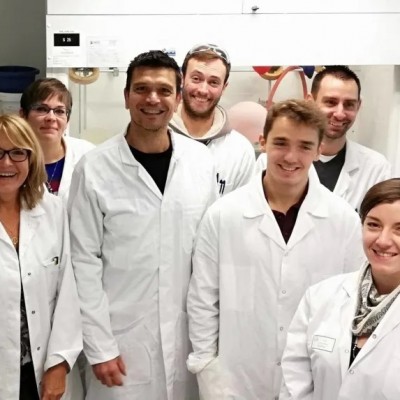Charity dedicated to the fight
against childhood cancer
against childhood cancer

Dr Fabienne Meggetto, you are research director at INSERM Toulouse. You have decided to focus your research on lymphomas in children. Can you tell us more about this project, and your motivations for working on childhood cancer?
Lymphoma is cancer that affects cells of the immune system, i.e. lymphocytes. Lymphocytes are white blood cells that help the body fight infections. They are made in the bone marrow, spleen, and lymph nodes, and then travel through blood and lymph vessels. Their mission is to identify and fight infections and abnormal cells. There are two main types of lymphocytes: B lymphocytes and T lymphocytes. Lymphoma occurs when abnormal / mutated B or T lymphocytes have grown out of control. The abnormal lymphocytes multiply in abnormal ways and as they accumulate, they eventually form tumors, especially in the lymph nodes. But as lymphocytes circulate throughout the body, they can affect many other organs as well. Lymphoma falls into two broad categories: Hodgkin lymphoma and non-Hodgkin lymphoma. In children under 15, the most common type of lymphoma is "non-Hodgkin's". These are the 3 rd cause of cancer in children after leukemia and brain tumors.
Anaplastic large cell lymphomas are aggressive non-Hodgkin lymphomas that affect T lymphocytes. Anaplastic large cell lymphomas, although rare, represent 15% of non-Hodgkin lymphomas in children and young adults, which makes them lymphomas. most common pediatric patients. In children, 90% of anaplastic large cell lymphomas are associated with a chromosomal translocation which results in the expression of an abnormal protein, NPM-ALK. Although NPM-ALK (+) anaplastic large cell lymphomas are relatively sensitive to chemotherapy, about 30% of young patients relapse early and these relapses have poor prognosis. The search for biomarkers of early relapses is therefore essential for this pediatric cancer.
MicroRNAs are part of the family of molecules called non-coding RNA. They form one of the major pathways for regulating gene expression. Our group is one of the first to have demonstrated in anaplastic large cell lymphomas NPM-ALK (+), microRNAs as tissue biomarkers of resistance to treatment. MicroRNAs are found in tumor cells and can be secreted into circulating body fluids such as blood. However, it has been reported that only 10% of known human microRNAs can be detected in plasma and around 30% of these are poorly represented forms. Our project is interested in other non-coding RNAs, circular RNAs, which are abundant, stable, very resistant molecules and which have been validated as serum biomarkers in solid tumors. Our main objective is therefore to identify serum circRNAs associated with failure / resistance to treatment of anaplastic large cell NPM-ALK (+) lymphomas in children.
What is the current therapeutic situation, and what are your hopes?
The standard treatment for pediatric anaplastic large cell lymphoma is a combination chemotherapy different from that used to treat anaplastic large cell lymphoma in adults. Although NPM-ALK (+) anaplastic large cell lymphomas are relatively sensitive to chemotherapy with high response rates, event-free survival is still between 65 and 75% in children. Thus about 30% of young patients relapses early and these relapses are always poor prognosis. Different targeted therapies, that is to say therapies directed specifically against tumor cells have already been tested for the management of chemo-resistant forms of anaplastic large cell lymphomas NPM-ALK (+) in children, such as therapy by antibodies, anti-ALK inhibitors, the leader being crizotinib, and more recently immunotherapy. These drugs are developed to block the growth or spread of tumor cells by acting on particular alterations that cause the development or spread of tumor cells. This so-called “targeted” action makes it possible to act more specifically on tumor cells and thus limit the damage suffered by normal cells. However, due to adverse reactions associated with treatment with certain antibodies, cases of sudden relapses following discontinuation of crizotinib, and no continued clinical remission after discontinuation of Crizotinib in other cases, clinicians are at an impasse therapeutic if a bone marrow transplant is not possible. The search for biomarkers of early relapses is therefore essential.
Do you plan to develop this project with other researchers - including internationally - and extend it to other types of pediatric cancers?
Prof. Laurence Lamant, referring pathologist for anaplastic large cell lymphomas (pathology department, Toulouse University Hospital, IUCT-Oncopole) and member of my group is historically involved in the morphological, genetic and molecular characterization of anaplastic large cell lymphomas. . She is a member of an interdisciplinary working group within the lymphoma committee of the French Society for Cancer in Children and Adolescents (SFCE). At the same time, we have long had collaborations with European and international cooperative groups active in childhood lymphoma. It also encourages interactions with the Adult Lymphoma Cooperative Group (Adult LYSA). Very soon a German pediatric neuro-oncopediatrician will join my group for two years. He will be 100% involved in the project and through his training we plan to extend our project to other pediatric cancers, in particular neuroblastoma . In fact, a mutation of the ALK gene has been described in approximately 12% of cases of neuroblastoma in children, which is the most frequent extracerebral solid malignancy in young children.
Did you encounter any financial or administrative difficulties in launching this project? What will Eva pour la vie's financial support allow you to do?
The financial support that I receive from the Eva pour la vie association is essential for the start of the new research project that I want to develop. Without this support, after several refusals, the project could not see the light of day for lack of funding. The money entrusted to me will allow me to carry out experiments essential to the start of the project and therefore to generate the first data. This step is essential for projecting the project towards a translational study with the clinic.
Eva pour la vie launched a fundraising initiative - now followed by numerous associations - aimed at encouraging the State to create a fund dedicated to research on childhood cancer, as well as to improve support for families. of sick children. With a first victory, undoubtedly insufficient but without precedent: the vote, at the end of 2018, of a new fund of 5 million euros / year for this research. What do you think ?
I “donf” support the motivation of the Eva Pour La Vie association and the Growing Up Without Cancer Federation because the absence of national calls for tenders specific to pediatric cancers is an aberration. Indeed even if certain cancers are observed at the same time in children and adults, they present their own specificities. It is therefore essential to be able to study / compare them in order to better characterize them in their biology and their responses to treatments. This in order to allow a better diagnosis, prognosis and to broaden the therapeutic options. But one of the engines of medical research remains the financial profits for the private industry often also involved in the financing of clinical trials. Childhood cancers being rare diseases and therefore a weak economic market, it is therefore somewhat interesting compared to adult cancers (lung cancer, breast, etc.). The state must compensate for this by ensuring the funding of research work without necessarily immediate financial benefits but advances in public health, such as the improvement of the prognosis, diagnosis of the care of patients and their families.
Scientific publication (November 2020)
T cells transformed in the laboratory help to better understand the origin of childhood lymphoma.
https://insb.cnrs.fr/fr/cnrsinfo/des-lymphocytes-t-transformes-en-laboratoire-aident-mieux-comprendre-l origin-dun-lymphome
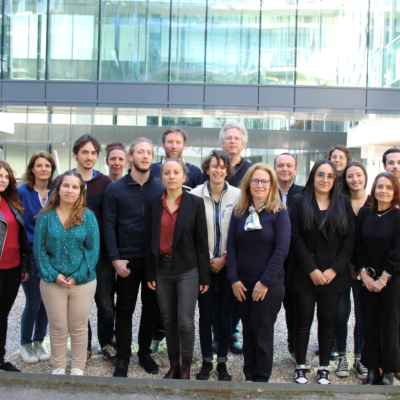
Eva pour la vie supports the Adapted Physical Activity project for children treated for Cancer and Insulin Sensitivity APACIS, led by Professor Marlène Pasquet, pediatric onco-hemato-immunologist at the children's hospital of the Toulouse University Hospital and Justine Thomas, APA teacher and doctoral student, as well as the recruitment of an APA position within this department.
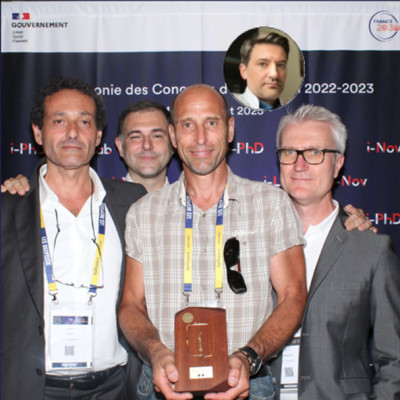
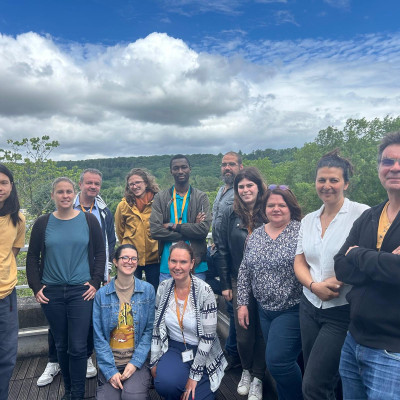
Eva pour la vie & Grandir Sans Cancer have decided to support the work of Dr. Célio POUPONNOT, at the Curie Institute, by funding the Project "Modeling of medulloblastoma using human cerebellar organoids and analysis of the effect of agricultural pollutants" through a grant. This research project includes a crucial environmental research component, the question of understanding in order to try to prevent being as important as the one that aims to better treat children with cancers ...
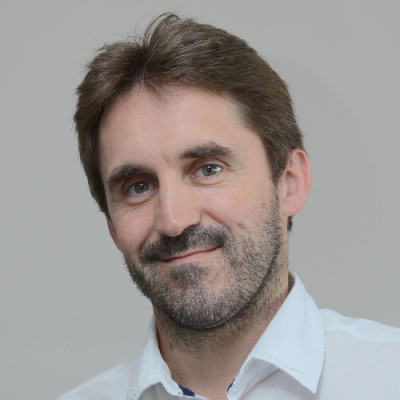
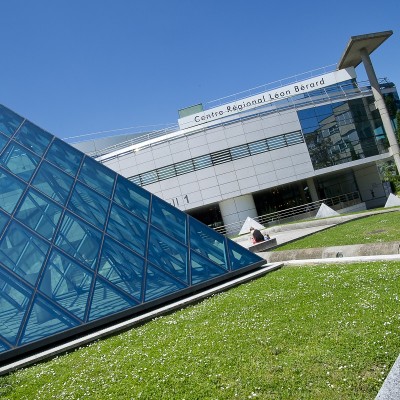
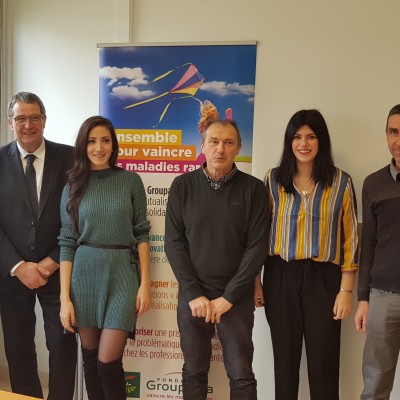
For more than 20 years, this teacher-researcher has been working on cancer. And it's been almost 10 years since he went to kidney cancer or renal cell carcinoma. By joining the team of Dr Christophe Grosset (Inserm, MiRCaDe team), he wanted to use his experience and take a new step forward by working on childhood cancer. He is the initiator of an ambitious project, which involves several surgeons, doctors and international researchers, on the study of nephroblastoma (or Wilms tumor) in children, co-funded by the association Eva pour la vie and Aidons Marina ...
Resistance to treatment is a major clinical problem, in particular in the case of osteosarcomas, bone tumors affecting children or adolescents. Indeed, chemotherapy, associated with surgery, is the central pillar of current treatment. However, many osteosarcomas are or become resistant to these antiproliferative drugs. Recurrences and / or the appearance of metastases are then frequent. 2 out of 5 patients cannot be cured! Osteosarcoma is therefore a pediatric cancer with a poor prognosis for which it is absolutely necessary to identify ways to counteract resistance to treatment in order to improve the chances of recovery for patients.
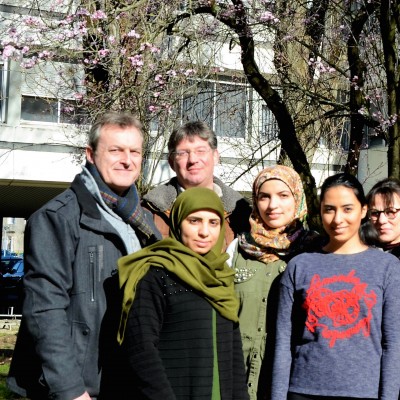
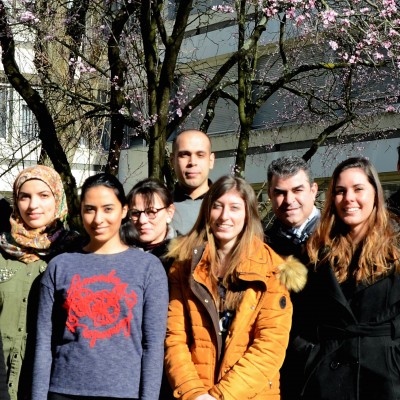
Since September 2014, Dr Martin Hagedorn has been leading a team of researchers (Caroline CAPDEVIELLE , Farah RAHAL, Justine CHARPENTIER and Mélissa MENARD) which devotes its research work to the identification of new therapeutic targets in brainstem tumors and to the improvement of its treatment methods. Work recognized by several European scientific teams & experts.
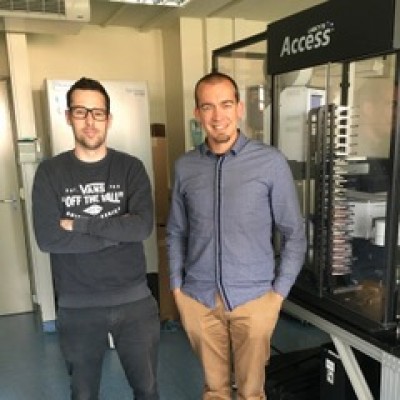
Dr Pasquier's research work mainly focuses on the repositioning of drugs which consists of testing, in new therapeutic indications, drugs already approved by the health authorities. The aim of this work is to identify new therapeutic targets for the most difficult to treat cancers and thus improve the care of patients suffering from these aggressive forms and refractory to treatment . In particular, pediatric cancers (neuroblastoma), brain tumors affecting children as well as adults (glioblastoma, medulloblastoma) as well as certain rare forms of cancer (angiosarcoma).
The work of the INSERM team co-directed by Dr Marie Castets (CR1 Inserm, HDR) and Dr Jean-Yves Blay (PUPH, HDR) focuses on cell death and cancers. Thanks to the support of Eva pour la Vie (55,000 euros) and other associations, this team is currently developing these lines of research on rhabdomyosarcomas, osteosarcomas and neuroblastomas ...
